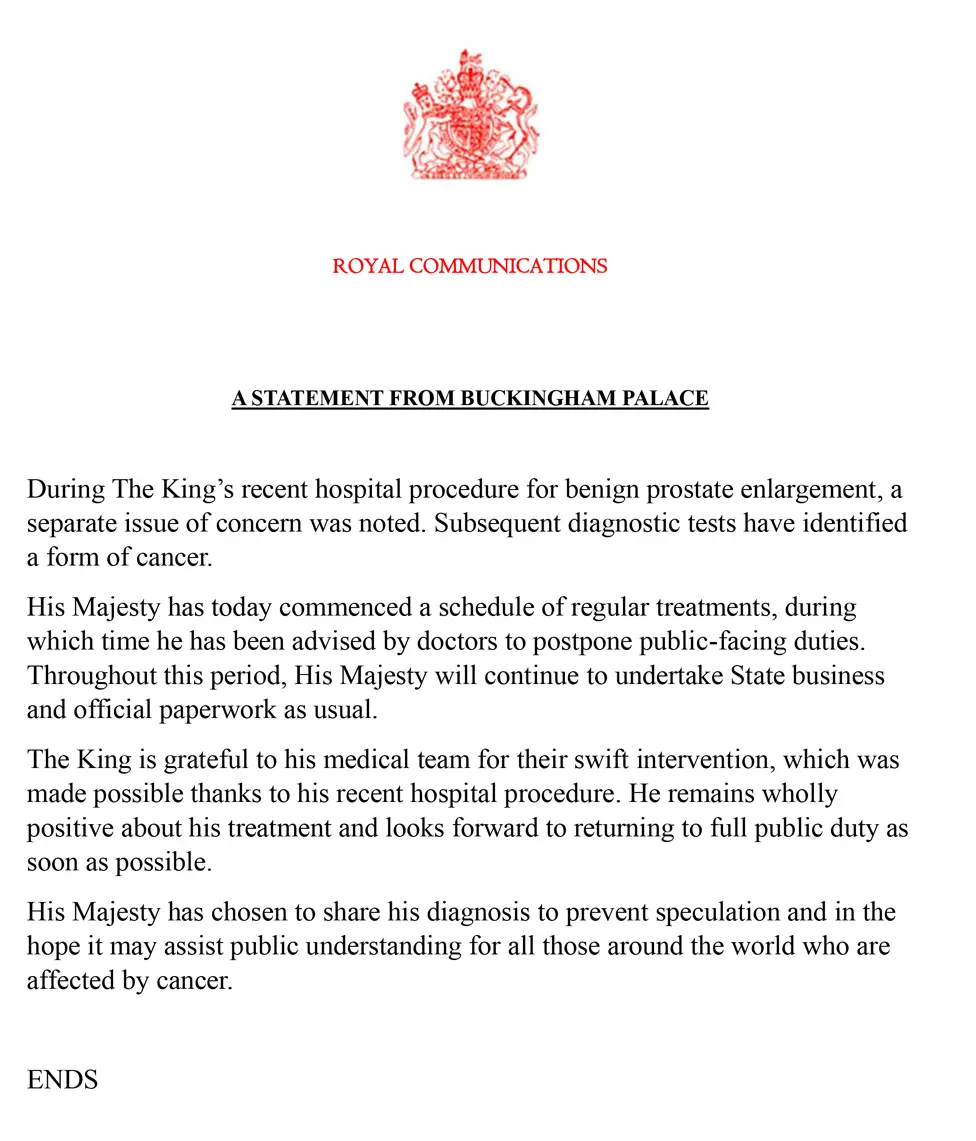Buckingham Palace announced a significant development on Monday, revealing that Britain’s King Charles III had been diagnosed with cancer.
The palace confirmed that the monarch would step back from his public-facing duties to undergo treatment.
The news came after the King, aged 75, underwent a corrective procedure for an enlarged prostate at a London hospital last month.
Following the procedure, further tests were conducted, and according to a statement from Buckingham Palace, it was revealed that there was the presence of a “form of cancer”.

Although the type of cancer detected was not specified, it was clarified that it was not prostate cancer.
In light of his diagnosis, King Charles III has commenced a schedule of regular treatments, prompting doctors to advise him to postpone public-facing duties temporarily.
However, the monarch will continue to manage state affairs and official paperwork as usual during this period of treatment.
The King had reportedly spent three nights at the London Clinic for his recent operation and had appeared to be in good spirits upon his discharge.

His return to public view occurred on Sunday when he attended a church service in Sandringham, Norfolk, accompanied by his wife, Queen Camilla.
Following his return from Sandringham, King Charles III began outpatient treatment in London.
The palace expressed gratitude to the medical team for their swift intervention and emphasized the monarch’s positive outlook towards his treatment.
The decision to disclose his diagnosis was made to prevent speculation and foster public understanding, particularly for those affected by cancer worldwide.
The discovery of cancer during treatment for an enlarged prostate raised questions amongst the public about the King’s health management.
CNN medical analyst Dr Jonathan Reiner suggested that routine evaluations during hospitalization such as chest x-rays might have uncovered these additional health issues.
King Charles III Became King Less than Two Years Ago
King Charles III ascended to the throne in September 2022 following the death of his mother, Queen Elizabeth II.
His illness has prompted discussions about the royal succession, with Prince William, next in line to the throne, poised to assume greater responsibilities.
Prince William’s return to public duties this week comes after supporting his wife, Catherine, Princess of Wales, during her recovery from abdominal surgery.
Meanwhile, the office of the Duke and Duchess of Sussex revealed that Prince Harry has made plans to visit King Charles III in the UK in the coming days.
The younger son of the King has had a long-standing public feud with his father and brother, as revealed in his memoir, Spare.
The prince and his wife Meghan Markle, Duchess of Sussex, had since stepped back from royal duties, though he did make a brief visit to the UK for the King’s coronation last year.
The announcement of Charles’s cancer diagnosis garnered reactions from political leaders worldwide.
Prime Minister of the United Kingdom Rishi Sunak expressed well wishes for the monarch’s speedy recovery, echoing sentiments shared by leaders of Commonwealth nations and French President Emmanuel Macron.
The health challenges facing the royal family have intensified in recent months. Charles’s illness follows health-related issues involving senior members of the royal family, including Princess Catherine’s abdominal surgery and Sarah Ferguson, Duchess of York’s diagnosis of malignant melanoma.
Despite facing health setbacks, King Charles III remains committed to fulfilling his duties, buoyed by the support of his family and well-wishers worldwide.
As the monarch undergoes treatment and the royal family navigates through health challenges, the world watches with concern and anticipation, awaiting updates on the King’s health and the monarchy’s future.
As per succession protocols, should the King become unable to carry out his constitutional duties, his powers could be delegated to a regent, with Prince William being the next in line to assume such responsibilities.
Would you be jailed for being half-naked in public? Well, the answer will shock you. Seriously. Watch this to the end and you'll understand:



